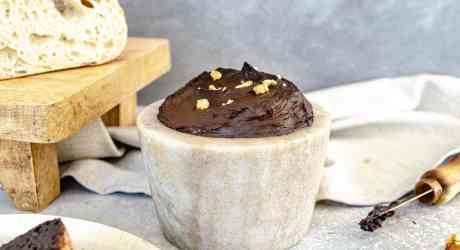Peppermint Mocha with Organic Tea or Espresso

We admit it: We love Starbucks' Peppermint Mocha. However, the refined sugars, trans fats and all those artificial additives it contains are just too much to stomach. So we decided to make our own to satisfy our craving, without draining our brain power in the process.
Then, we had another idea!
Because one of our Brain Food Revolution goals is to make dining out (and drinking out) better for our brain and mental health, we decided to bring this beverage to our hometown of Calgary, Alberta. We partnered up with a local tea and coffee shop called The Tea Factory and launched it there as a special beverage over the holidays. And not only did we offer a NeuroTrition Peppermint Mocha using organic espresso we also created a Peppermint Tea Latte using organic peppermint tea just for their tea loving customers.
This drink became their top seller over the holiday season, out performing all other drinks combined in sales and gaining new customers for the shop! It created some cool buzz around the fact that healthier, whole foods can be used in place of the typical low quality ingredients, without increasing price or compromising flavour (according to fans, it tasted better and a few said it was the best holiday beverage they had ever had). And it was the first time a cafe in Calgary offered coconut milk as a dairy alternative. We are so proud of this, and happy to see this trend taking off and coconut milk becoming more available. Please beware though: some places advertising coconut milk are in fact using coconut beverage, which contains very little coconut milk but a lot of sugar and artificial additives. So always ask.
Ready to channel your inner barista and enjoy it at home? Try our homemade tea and espresso versions below.
Peppermint Tea Latte Ingredients:
- 4 oz. hot organic peppermint tea
- 2 tsp Peppermint Mocha Syrup, warmed
- 8 oz. unsweetened coconut milk, from tetra pac
- 1/4 tsp pure vanilla extract*
- 1 tsp pure maple syrup
- 1/2 tsp 84% dark chocolate bar shavings
- 2 Tbsp Coconut Whipped Cream (optional)
Peppermint Mocha Ingredients:
- 2 shots fair trade organic espresso (If you don’t have an espresso machine, you can substitute 1/4 cup dark strong coffee)
- 3 tsp Peppermint Mocha Syrup, warmed
- 8 oz. unsweetened coconut milk, from tetra pac
- 1/4 tsp pure vanilla extract*
- 1 tsp pure maple syrup
- 2 Tbsp Coconut Whipped Cream (optional)
Peppermint Tea Latte Method:
- Place Peppermint Mocha Syrup in warm water while prepping drink to ensure melted consistency for proper incorporation into milk.
- Steep peppermint tea for 3-4 minutes, and then stir in maple syrup and vanilla extract.
- Option 1: If you have an espresso machine.
While tea is steeping, thoroughly mix Peppermint Mocha Syrup into coconut milk. Then steam with steam wand until hot.
Option 2: If you do not have an espresso machine.
While tea is steeping, fully incorporate coconut milk and Peppermint Mocha Syrup in a small saucepan over low heat, and bring to a simmer. - Slowly add milk mixture to tea. Top with Coconut Whipped Cream (optional) and shaved dark chocolate. Serve and enjoy!
Peppermint Mocha Method:
- Place Peppermint Mocha Syrup in warm water while prepping drink to ensure melted consistency for proper incorporation into milk.
- Option 1: If you have an espresso machine.
Thoroughly mix Peppermint Mocha Syrup into coconut milk. Then steam with steam wand until hot.
Option 2: If you do not have an espresso machine.
Fully incorporate coconut milk and Peppermint Mocha Syrup in a small saucepan over low heat, and bring to a simmer. - Option 1: If you have an espresso machine.
Pull espresso shots into mug, stir in maple syrup and vanilla extract. - Option 2: If you do not have an espresso machine.
Place espresso or coffee into mug, stir in maple syrup and vanilla extract. - Slowly add milk mixture to espresso mixture. Top with Coconut Whipped Cream (optional) and shaved dark chocolate. Serve and enjoy!
*Look for “vanilla bean extract” on the ingredient list, not “vanilla flavouring.”

Tea:
- Tea might just be what the doctor ordered as it is associated with a lower risk for developing depression (without added artificial sweeteners though, as they increase the risk).
- There is promising research suggesting that compounds found in tea can aid in growth of cells in the brain!
Dark Chocolate:
- One class of compounds found in chocolate (flavonoids), has been found to limit the loss of function in brain cells, which might reduce the risk of developing neurodegenerative disorders such as Alzheimer’s disease.
- Feeling a little anxious? Moderate intake of cacao, found in high quality chocolate, has been shown to have anxiolytic (anxiety reducing) effects!
Espresso:
- Espresso may help you age a little more gracefully as its consumption is associated with a decrease in the risk for neurodegenerative disorders such as Parkinson’s disease.
- Can increase insulin sensitivity, which means that the sugar you consume is being processed efficiently, and not circulating through your body in large quantities causing damage.
- References
-
- Gundimeda, U., McNeill, T. H., Fan, T. K., Deng, R., Rayudu, D., Chen, Z., & Gopalakrishna, R. (2014). Green tea catechins potentiate the neuritogenic action of brain-derived neurotrophic factor: role of 67-kDa laminin receptor and hydrogen peroxide. Biochemical and biophysical research communications, 445, 218-224.
- Guo, X., Park, Y., Freedman, N. D., Sinha, R., Hollenbeck, A. R., Blair, A., & Chen, H. (2014). Sweetened beverages, coffee, and tea and depression risk among older US adults. PloS one, 9, e94715.
- Hu, G., Bidel, S., Jousilahti, P., Antikainen, R., & Tuomilehto, J. (2007). Coffee and tea consumption and the risk of Parkinson's disease. Movement Disorders, 22, 2242-2248.
- Rebello, S. A., Chen, C. H., Naidoo, N., Xu, W., Lee, J., Chia, K. S., & van Dam, R. M. (2011). Coffee and tea consumption in relation to inflammation and basal glucose metabolism in a multi-ethnic Asian population: a cross-sectional study. Nutrition journal, 10, 1.
- Spencer, J. P. (2009). Flavonoids and brain health: multiple effects underpinned by common mechanisms. Genes & nutrition, 4, 243-250.
- Yamada, T., Yamada, Y., Okano, Y., Terashima, T., & Yokogoshi, H. (2009). Anxiolytic effects of short-and long-term administration of cacao mass on rat elevated T-maze test. The Journal of nutritional biochemistry, 20, 948-955.










